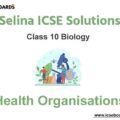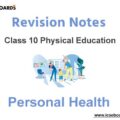Question 1. Define the following:
(i) Disease
(ii) Health
(iii) Vaccinations
(iv) Immunity
(v) Antiseptic
(vi) Cancer
(vii) Allergy
(viii) Hypersensitivity
(ix) Immunization
(x) Disinfectant
(xi) Penicillin
(xii) Suphonamide drugs
(xiii) Acquired disease
(xiv) Prophylaxis
(xv) Antibiotic
Solution 1:
1. Disease: When the functioning of one or more organs or systems of the body is adversely affected, characterized by various signs and symptoms we say that we are not healthy, i.e we have a disease.
2. Health: the term health is very frequently used by everybody. Health does not simply mean absence of disease or physical fitness.
3. Vaccinations: introduction of vaccine for antibody production is known as vaccination it is based upon the property of memory.
4. Immunity: overall ability of a body to fight against the disease causing pathogen is known as immunity
5. Antiseptics: to prevent the growth of microorganisms on the surface of the body some chemicals are applied it is known as antiseptic.
6. Cancer: on control or abnormal division of cell which is characterized by a mass of cloned cell tumor is known as cancer.
7. Allergy: The hypersensitiveness of a person to some foreign substances are called allergy.
8. Hypersensitivity: The exaggerated response of the immune system to certain antigen present in environment the substance to which such as immune response is produced are called allegiance it may be mites dust, pollens, animal dander fibers feathers heat cal sunlight etc.
9. Immunization: Formation or development of antibodies/immunity through vaccination.
10. Disinfectant: Disinfectants are chemicals that are applied to places to prevent bacteria from growing.
11. Penicillin: First antibody which is discovered by Alexander Fleming by the fungus penicillin not atum.
12. Sulphonamide drugs: Sulphonamide medicines are a class of synthetic medications that inhibit bacterial growth and multiplication. Sulphadrugs are the common name for them
13. Acquired disease: Disease which is caused by pathogens and microbes, disease acquired after birth are called acquired.
14. Prophylaxis: A prophylactic is a step done to keep one’s health and prevent disease from spreading
15. Antibiotic: Antibiotics are microorganism-produced chemical compounds that kill or inhibit the growth of disease-causing bacteria
Question 2. Differentiate between the following:
(i) Antigen and Antibody
(ii) Antiseptic and Antibiotics
(iii) Serum and Plasma
(iv) Toxins and Antitoxins
(v) Vaccination and Sterilization
(vi) Disinfectant and Antiseptic
(vii) Active immunity and Passive immunity
(viii) Acquired disease and Congenital disease
Solution 2:
(i) Antigen and Antibody
| Antigen | Antibody |
| Antigens are pathogen-derived foreign particles that induce antibody synthesis. | Antibodies are chemicals that are created in reaction to the presence of an antigen or that occur naturally. |
(ii) Antiseptic and Antibiotics
| Antiseptic | Antibiotics |
| Antiseptics are the chemical used on the body to kill the micro-organisms. | Antibiotics are chemical compounds produced by microbes that prevent another microorganism from growing. |
(iii) Serum and Plasma
| Serum | Plasma |
| It’s a pale yellow liquid that separates from blood clots after they’ve been coagulated. | It is the fraction of blood that is liquid and contains fibrinogen as well as other organic and inorganic components. |
(iv) Toxins and Antitoxins
| Toxins | Antitoxins |
| It’s a harmful chemical produced by bacteria. | Chemical compounds produced by microorganisms are employed to combat hazardous chemicals in the body. |
(v) Vaccination and Sterilization
| Vaccination | Sterilization |
| It is the process of administering vaccines to the body in order to create immunity to a certain disease. | It’s the procedure of using heat or chemicals to kill germs. |
(vi) Disinfectant and Antiseptic
| Disinfectant | Antiseptic |
| The chemical used to limit the growth of microorganisms on the site. | The chemical that is used to kill microorganisms on the human body. |
(vii) Active immunity and Passive immunity
| Active immunity | Passive immunity |
| It is a type of immunity induced by infection or vaccination with attenuated germs and antigens by one’s own body. | It’s a type of immunity that comes from the outside and is delivered in the form of ready-made antibodies. |
(viii) Acquired disease and Congenital disease
| Acquired disease | Congenital disease |
| Acquired diseases are those that are caused by a pathogen or a nutrient shortage. | Congenital disorders are illnesses that affect people from the moment they are born. |
Question 3. What is artificial respiration?
Solution 3:
Artificial Respiration is a first-aid technique for restoring or maintaining breathing in someone who has stopped breathing. The approach involves forcing air into and out of the lungs in a rhythmic manner, either mechanically or manually.
Question 4. What is DPT?
Solution 4:
Here ‘D’ stands for Diphtheria ‘P’ stands for Pertussis and ‘T’ stands for Tetanus.
Question 5. What is haptene?
Solution 5:
Haptene are antigens that do not excite the immune system of a person’s body.
Question 6. Name any three germ killing secretions of our body.
Solution 6:
Below are the germ killing secretions of our body:-
1. Mucus secretions from windpipe
2. Hydrochloric secretions from stomach
3. Tears from eyes.
Question 7. What does BCG stand for?
Solution 7:
BCG stands for: Bacillus Calmette Guerin.
Question 8. Define giving one example of each:
(i) Antiseptic
(ii) Antibiotic
Solution 8:
1. Antiseptic: Antiseptics are chemical substances that are applied to the body to kill or prevent bacteria from growing. It is safe for the skin and the body Example: Halogens.
2. Antibiotic: Antibiotics are microorganism-produced chemical compounds that kill or inhibit the growth of disease-causing bacteria. Example: Penicillin
Question 9. Give the appropriate term for the following:
(i) Providing readymade antibodies from outside for treating certain infectious diseases.
(ii) Mild chemical applied on the skin to kill germs.
Solution 9:
1. Passive acquired immunity
2. Antiseptics
Question 10. Complete the following statement choosing the correct alternative:
Penicillin obtained from a fungus is an ______. (antiseptic/ antibody/ antibiotic)
Solution 10:
Penicillin obtained from a fungus is an Antibiotic.
Question 11. Describe briefly the functions of an antiseptic.
Solution 11:
Antiseptics are chemical substances that are applied to the body to kill or prevent bacteria from growing. It is safe for the skin and the body. Alcohols and halogens, for example, can be used as antiseptics on the skin.
Question 12. Name any two international health organisations.
Solution 12:
The two international health organisations
(i) WHO (World health organisations)
(ii) Red Cross
Question 13. Define vaccination.
Solution 13:
Introduction of vaccine for antibody production is known as vaccination it is based upon the property of memory.
Question 14. Explain briefly the role of the following aids:
(i) Disinfectants
(ii) Penicillin
(iii) Sulphonamides
(iv) Vaccines
Solution 14:
1. Disinfectants: Disinfectants are chemicals that are applied to places to prevent bacteria from growing. It is a strong germ-killing substance. But it may cause harm to skin and body. Example: Lysol, DDT etc.
2. Penicillin: Penicillin is the first antibiotic discovered by Alexander Fleming. It is obtained from Penicillium notatum. It has a very high therapeutic value and used against bacteria causing pneumonia, sore throat etc.
3. Sulphonamides: Sulphonamide medicines are a class of synthetic medications that inhibit bacterial growth and multiplication. Sulphadrugs are the common name for them.
4. Vaccines: introduction of vaccine for antibody production is known as vaccination it is based upon the property of memory
Question 15. Fill in the blanks:
(i) Antibodies are ______.
Solution :
Antibodies are proteins that react with antigens or invading germs.
(ii) Antibodies are produced on exposure to ______.
Solution :
Antibodies are produced on exposure to antigen.
(iii) ______ is an antibiotic, used to treat diseases like pneumonia and ______.
Solution :
Penicillin is an antibiotic, used to treat diseases like pneumonia and rheumatic fever.
Question 16. Mention if the following statements are true or false:
(i) DDT is a disinfectant.
Solution :
True
(ii) Penicillin is a disinfectant.
Solution :
False
(iii) Chemicals applied to spots and places to kill harmful microorganism are called disinfectants.
Solution :
True
(iv) Our body can make only a limited variety of different antibodies.
Solution :
True
(v) Salk vaccine is used against tuberculosis.
Solution :
False
(vi) Active immunity means that antibodies are produced by the individual itself.
Solution :
True
(vii) Passive immunity develops after having a disease.
Solution :
False
(viii) WHO procures and provides blood to victims of war.
Solution :
True






